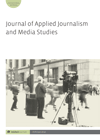
Full text loading...
 , Silvio Waisbord2
, Silvio Waisbord2
The COVID-19 pandemic, global economic downturn, anti-press violence and worsening situation of labour precarity for journalists around the world have led to increased stress, trauma and burnout in the profession, which raises questions at the heart of media sustainability and approaches to media development in a global context. Our study builds on the conceptual framework of professional and collective resilience research to analyse the content of media development work on publicly facing websites of a census of implementing organizations represented on the Center for International Media Assistance website (N = 18). Our findings suggest that donors and other sponsors of media development work should consider making resilience a core component of global programmes in support of media democracy and journalism. Though programmatic agendas in global media development are crowded with multiple goals in response to complex problems, we believe that resilience should be prioritized. This work cannot be done without a nuanced analysis of local causes of emotional distress as well as local understandings of emotional labour and repair. Working with journalists’ support organizations and employers in conducting diagnoses, identifying suitable actions and promoting sustainable practices is imperative. Recommendations and actions need to be sensitive to local conditions, demands and opportunities. While immediate remediation actions are important, it is also important to keep attention on long-term structural matters that cause emotional distress.

Article metrics loading...

Full text loading...
References


Publication Date:
https://doi.org/10.1386/ajms_00089_1 Published content will be available immediately after check-out or when it is released in case of a pre-order. Please make sure to be logged in to see all available purchase options.